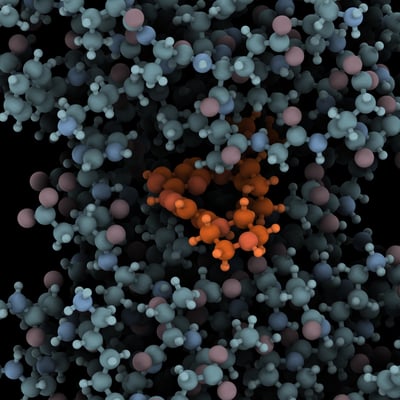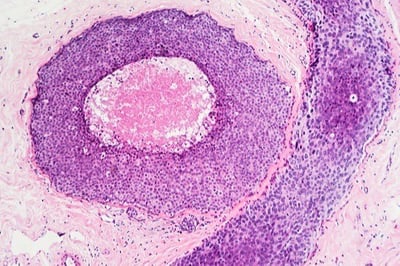Breast Cancer



Relevance: High
Most relevant for: People diagnosed with metastatic breast cancer
Study: Supportive care can improve quality of life for people with metastatic breast cancer
Metastatic breast cancer patients have unique needs for treatment and care. Connecting patients to appropriate support services and palliative care is an area of need in health care. A recent study reported improvement in metastatic breast cancer patient quality of life and wellness with an intervention program called the Supportive, Education and Advocacy (MBC-SEA) program. (8/21/19)
READ MORE ›


Relevance: High
Most relevant for: People with a personal or family history of cancer where no mutation has been found
Study: MRI or mammograms for detecting breast cancer in families with unknown genetic mutations?
MRI and mammograms are used together to detect breast cancer in high-risk women who test positive for a BRCA or other gene mutation that increases the risk for breast cancer. For women with a family history of breast cancer but no known genetic mutation, increased screening is recommended. But what method is best? A recent clinical trial in the Netherlands compared MRI and mammography for this population. (8/15/19)
READ MORE ›


Relevance: Medium-High
Most relevant for: Young women who find a breast lump and young women newly-diagnosed with breast cancer
Study: Diagnosis and treatment delays in young women with breast cancer
Young women are more likely to have delays in a breast cancer diagnosis and treatment. Factors that affect these delays include pregnancy, breastfeeding, financial concerns and having a family history of breast or ovarian cancer. (8/5/19)
Este artículo está disponible en español.
READ MORE ›


Relevance: High
Most relevant for: Women with, or considering breast reconstruction with implants
Guideline: FDA asks Allergan to recall certain textured breast implants
On July 25, 2019, the Food and Drug Administration requested that breast implant manufacturer Allergan recall its BIOCELL textured implants and expanders due to an association with a rare type of lymphoma called Breast Implant Associated Anaplastic Large Cell Lymphoma or BIA-ALCL. The FDA does not recommend removing implants for people who do not have disease symptoms. This XRAYS review updates information about this FDA recall. (7/29/19)
READ MORE ›


Relevance: High
Most relevant for: People with metastatic, hormone-positive, Her2-negative breast cancer
Study: CDK inhibitors may increase survival for ER-positive metastatic breast cancer patients
The phase III MONALEESA-7 study is a clinical trial looking at the effect of a type of treatment known as a CDK4/6 inhibitor in pre- or perimenopausal women with hormone receptor–positive advanced breast cancer. (7/22/19)
READ MORE ›



Relevance: Medium-High
Most relevant for: LGBTQ cancer patients and their healthcare providers.
Study: LGBTQ patients recommend improvements for their cancer care
Very little research has focused on the cancer care experiences of lesbian, gay, bisexual, transgender and queer (LGBTQ) people. This study looks at recommendations from the LGBTQ community for improving their cancer care. (6/20/19)
READ MORE ›


Relevance: High
Most relevant for: People with early-stage, Her2-positive breast cancer (stages 1-3)
Study: New targeted therapy approved for early-stage HER2-positive breast cancer
The KATHERINE trial looked at the benefit of the new drug, Kadcyla, for treating early-stage breast cancer after surgery and chemotherapy. The results of this study led to FDA approval in May 2019. (6/17/19)
READ MORE ›


Relevance: Medium-High
Most relevant for: Post-menopausal women with no breast cancer diagnosis
Study: A low-fat diet may decrease postmenopausal breast cancer deaths
Research reported at the 2019 annual meeting of the American Society of Clinical Oncology establishes a link between dietary fat intake and its impact on postmenopausal women’s risk of dying from breast cancer. (6/13/19)
READ MORE ›


Relevance: Medium-High
Most relevant for: Young women of color with a BRCA mutation
Personal Story: A young woman's story of genetic testing and risk-reducing mastectomy
Alejandra Campoverdi comes from a family with three generations of breast cancer. As a former White House aide and active educator in the Latina community, she has openly shared her story of genetic testing, her BRCA2 mutation and her plans for risk-reducing mastectomy at age 39. (6/6/19)
Este artículo está disponible en español.
READ MORE ›


Relevance: High
Most relevant for: People with metastatic, triple-negative breast cancer
Guideline: FDA approves an immunotherapy treatment for some patients with triple-negative breast cancer
THIS INFORMATION HAS BEEN UPDATED: In August 2021 Roche voluntarily withdrew their FDA accelerated approval for Tecentriq (atezolizumab) in combination with chemotherapy (Abraxane®, albumin-bound paclitaxel; nab-paclitaxel) for the treatment of adults with unresectable locally advanced or metastatic triple-negative breast cancer (mTNBC) whose tumours express PD-L1.
The FDA approved the use of the immunotherapy drug atezolizumab (Tecentriq) in combination with the chemotherapy agent nab-paclitaxel (Abraxane) for certain patients with advanced triple-negative breast cancer. (5/26/19)
READ MORE ›